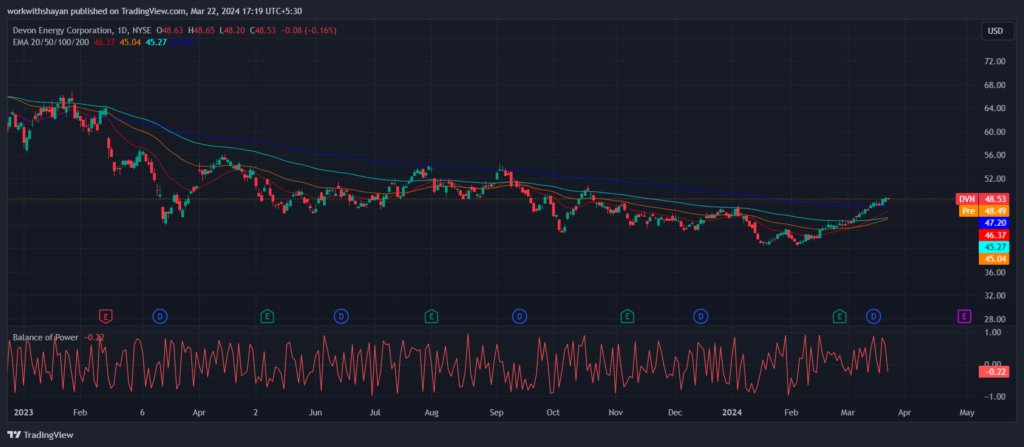- Devon Energy: A Quick Introduction
- DVN Stock: History And Political Activity
- Political Involvement
- DVN Stock: Price History
- DVN Stock Dividend History
- DVN Stock Price Forecast: Technical Analysis
- DVN Stock Price Prediction By Blockchain Reporter
- DVN Stock Price Prediction 2024
- DVN Stock Price Prediction 2025
- DVN Stock Price Prediction 2026
- DVN Stock Price Prediction 2027
- DVN Stock Price Prediction 2028
- DVN Stock Price Prediction 2029
- DVN Stock Price Prediction 2030
- DVN Stock Price Target: By Experts
- Conclusion
- FAQ
Devon Energy Corporation is a big player in the energy industry, particularly known for its work in oil and natural gas. Founded in 1971 and based in Oklahoma City, this company has carved out a significant spot for itself in the sector. Its journey began with a modest intention, but over the years, it has grown into a powerhouse, boasting operations in various key locations. This growth is not just about expanding geographically but also involves diving into different zones of energy production, including exploration, development, and production. What makes Devon Energy stand out is its commitment to innovation and sustainability. As the world moves towards a more energy-conscious future, the company has been actively adapting its strategies to not only meet the current demands but also anticipate future trends. This foresight has allowed it to maintain a strong position in the market, even as the industry faces challenges. Through strategic acquisitions, technological advancements, and a focus on efficient practices, Devon Energy has established itself as a leader in the energy domain, providing valuable resources that power homes, businesses, and industries across the globe. In this article, we’ll explore DVN stock dividend and its history with in-depth technical analysis of the DVN share price to evaluate the future market potential.
Devon Energy: A Quick Introduction
Devon Energy Corporation, a Delaware-registered firm, specializes in finding and extracting hydrocarbons across the United States. With its main offices nestled within the towering 50-story Devon Energy Center in Oklahoma City, Oklahoma, the company’s focal areas of operation include the Barnett Shale and STACK formation in Oklahoma, the Delaware Basin, the Eagle Ford Group, and regions within the Rocky Mountains.
In the fiscal year 2023, Devon Energy achieved notable rankings, placing 216th on the Fortune 500 list and 445th on the Forbes Global 2000 list, marking its significance on both national and global scales.
By the end of 2021, Devon Energy reported substantial proven reserves amounting to 1,625 million barrels of oil equivalent (approximately 9.94×10^9 GJ). The composition of these reserves was diverse: 44% consisted of petroleum, 27% of natural gas liquids, and the remaining 29% of natural gas, showcasing the company’s broad portfolio in energy resources.
Devon Energy, a leading U.S. oil and gas company listed on the New York Stock Exchange under DVN, is reportedly in the process of contemplating a purchase of Enerplus, another NYSE-listed firm (ERF), for a sum of $3 billion. This consideration comes despite experiencing a 43% decrease in free cash flow, attributed to falling natural gas prices. Nevertheless, Devon Energy’s third-quarter earnings significantly exceeded expectations.
Looking ahead, the company has its sights set on amplifying its production rates in the fourth quarter. It anticipates achieving a daily production rate between 640,000 and 660,000 barrels of oil equivalent, surpassing initial forecasts. This ambition is backed by planned capital expenditures ranging from $870 million to $930 million. Devon Energy is committed to enhancing its capital efficiency, with a strategic focus on investing in its Delaware basin assets and central operations, even as its stock performance lags behind that of its industry counterparts.
DVN Stock: History And Political Activity
Devon Energy, established in 1971 by John Nichols and his son, J. Larry Nichols, made its debut as a public entity through an initial public offering in 1988. By August 2000, it had earned a spot on the S&P 500. In 2004, Devon faced shareholder resolutions urging the company to assess its impact on climate change, reflecting the growing environmental consciousness among investors. August 2008 marked the passing of co-founder John Nichols.
March 2010 saw Devon selling its operations in Brazil, Azerbaijan, and the Gulf of Mexico to BP for $7 billion, signifying a strategic refocusing. By October 2012, Devon had inaugurated its new 50-story headquarters, the Devon Energy Center, in Oklahoma City, consolidating its operations by closing its Houston office. In a continuation of its asset optimization strategy, April 2014 witnessed the sale of its conventional assets in Canada to Canadian Natural Resources for CAD 3.125 billion, followed by a sale of additional assets to Linn Energy for $2.3 billion in June 2014.
Dave Hager took the helm as president and CEO in August 2015. The economic downturn prompted Devon to announce a major workforce reduction of 1,000 employees, including 700 in Oklahoma City, and a dividend cut in February 2016. The company continued to divest assets, including its Lavaca County holdings in the Eagle Ford in 2017, and in June 2019, it completed the sale of its Canadian assets to Canadian Natural Resources for CAD 3.8 billion. November 2019 was marked by a critical operational challenge when the company successfully mitigated a natural gas well blowout near Eagle Ford, showcasing its commitment to safety and environmental stewardship.
Political Involvement
Over the past three U.S. election cycles, Devon Energy has consistently donated over $1 million, with the vast majority of its contributions going to entities and individuals associated with the Republican Party. In the 2016 cycle, the company donated $750,000 to the Senate Leadership Fund, aiming to maintain the Republican control of the U.S. Senate, and $500,000 to the Congressional Leadership Fund, focused on preserving the Republican majority in the House of Representatives.
Devon Energy and its lobbyists are known for their strong connections with government figures. A notable instance highlighted by The New York Times in 2014 involved a letter to the U.S. Environmental Protection Agency, ostensibly from Scott Pruitt, the Oklahoma Attorney General at the time, advocating for more lenient hydraulic fracturing regulations. The investigation revealed that the letter was actually drafted by Devon Energy’s lobbyists, not by Pruitt himself.
In 2015, a proposal from shareholders sought to make the company more transparent about its lobbying activities, particularly those aimed at opposing climate change regulations. This resolution garnered support from about 20% of the shareholders, indicating a significant interest among investors in the company’s political and environmental advocacy practices.
DVN Stock: Price History
DVN’s journey began modestly in 1985, with stock prices hovering below $5. The late ’80s and early ’90s saw gradual growth, occasionally punctuated by dividends and stock splits, indicative of a young company gaining its footing. The stock price remained relatively stable, hovering around the $10-$20 range by the late ’90s, reflecting steady, if unspectacular, growth.
The turn of the millennium marked a period of expansion and volatility for DVN. Prices soared above $115 in 2008, driven by booming energy prices and growth in the sector. However, this peak was followed by a sharp decline during the global financial crisis, illustrating the stock’s vulnerability to broader economic pressures.
The 2010s were characterized by recovery and challenges. DVN’s stock price faced pressure from fluctuating oil prices, regulatory changes, and evolving global energy dynamics. Despite these hurdles, the company managed to navigate through, as evidenced by regular dividend payouts and a commitment to strategic growth, even though the stock price saw significant fluctuations. The stock price continued to decline heavily and touched the low of $20 in 2016.
The price further came down due to Covid pandemic in 2020, dropping below $10. However, it has since recovered as it aims to consolidate within $50-$70.
DVN Stock Dividend History
Since 1995, DVN’s dividend history reveals a long-term commitment to returning value to shareholders through consistent cash dividends, highlighting the company’s financial growth and strategic decisions over nearly three decades.
Starting in 1995, DVN’s dividends were modest, with a cash payout of $0.03 per share. This modest beginning set the stage for the company’s approach to shareholder returns. Over the initial years, the dividends remained steady, reflecting a cautious but steady approach to dividend policy amidst the operational and market conditions of the time.
As we moved into the early 2000s, the dividends saw a gradual increase, signaling the company’s growing stability and confidence in its financial performance. By 2004, dividends had doubled to $0.10 per share from the $0.05 level maintained from 1998 through 2003. This period of increment signifies DVN’s operational success and a stable financial outlook that allowed for higher distributions to shareholders.
The trend of incrementally increasing dividends continued, with notable milestones in the late 2000s. By 2007, dividends had increased to $0.14 per share, showing growth even as the energy sector faced significant challenges.
Entering the 2010s, DVN maintained a stable dividend policy, gradually increasing the cash payouts to shareholders. The dividends reached $0.24 per share by 2015, a showcase to DVN’s solid operational performance and strategic financial management.
However, the most significant changes came in the early 2020s, when DVN displayed a marked increase in dividend payments, reflecting perhaps a combination of robust financial health, strategic capital allocation decisions, and a favorable outlook on the energy market. For instance, in 2022, the company paid dividends as high as $1.55 per share in some quarters, suggesting a period of high profitability and possibly a strategic decision to return more capital to shareholders.
In early 2024, DVN declared a cash dividend of $0.22 per share, with the declaration made on February 27, 2024, and the payment will be executed on March 28, 2024. This dividend amount represents a slight increase from the $0.20 per share declared in December 2023 but is considerably lower than the dividends paid in the preceding quarters of 2023, where the amounts ranged significantly, reaching as high as $0.52 in June and $0.49 in September.
The annual dividend is currently at $0.88, with a dividend yield of 1.81% and PE ratio of 8.32.
DVN Stock Price Forecast: Technical Analysis
Lately, DVN stock has seen a noticeable surge in value, causing a push in its upward journey. However, bears continue to defend the resistance channels, resulting in a minor correction for the DVN stock price near $50. Market conditions, largely driven by the company’s financial results and DVN stock dividend, have had a positive effect on the company’s share price. An in-depth examination of DVN technical charts reveals some bullish signs, although they might soon fade if sellers intensify their bearish dominance. Investors are encouraged to exercise caution, given the uncertain short-term growth prospects of DVN stock price. The durability of a surge appears uncertain, raising doubts about DVN stock’s capacity to maintain its top-tier investment status.

TradingView reports that DVN shares currently stand at $48.5, showcasing a slight decline of more than 0.16% in the past day. An in-depth examination of DVN stock price indicates that while the downward trend may still be present, there’s a strong possibility for a bullish turnaround as the stock has been climbing since the past few weeks. Despite the stock facing challenges at its immediate resistance levels, there’s an underlying potential for increased buying interest near immediate Fib channels that could drive a positive momentum shift. A glance at the daily price chart reveals that DVN shares have found a support line around the $40 mark, a point from which the share price could aim to overcome the next resistance barrier. With DVN stock price recently crossing multiple EMA trend lines following a surge above $45, it’s plausible that investors may be lured to enter long positions, potentially driving the share price upwards in the following days. The Balance of Power (BoP) indicator currently resides in a bearish area at 0.22, suggesting downward correction could be on the horizon.
To thoroughly analyze the price of DVN shares, it is crucial to take a look at the RSI-14 indicator. The RSI indicator recently experienced a surge and it currently hovers at 63-level, around the overbought region, suggesting intense buying momentum. It is anticipated that DVN stock price will soon attempt to break above its 38.6% Fibonacci level to achieve its short-term bullish goals. If it fails to climb above this Fibonacci region, a downtrend might occur.
As the SMA-14 continues its upward swing near the 67-level, it trades way above the RSI line, potentially accelerating the stock’s upward correction on the price chart. However, if DVN shares break above the consolidation zone and surge above the EMA20 trend line, it can pave the way to the crucial resistance of $56. A breakout above the strong resistance will drive the share price toward the upper limit of the Bollinger band at $67.
Conversely, if DVN stock price fails to hold above the critical support level of $40, a sudden collapse may occur, resulting in further price declines and causing the DVN share to trade near the crucial support zone at $32.
DVN Stock Price Prediction By Blockchain Reporter
DVN Stock Price Prediction 2024
The DVN stock is forecasted to achieve a minimum price of $34 in 2024. It is anticipated that the stock could reach a maximum price of $61, with an average trading price of $52 throughout the year.
DVN Stock Price Prediction 2025
Based on projections and market analysis, the price of DVN stock in 2025 is expected to have a minimum value of $45. The maximum stock price is predicted to be $77, with an average value of $63 over the year.
DVN Stock Price Prediction 2026
The DVN stock price in 2026 is predicted to start at a minimum of $56. The maximum price could soar to $93, while the average price is expected to be $74.
DVN Stock Price Prediction 2027
For 2027, the DVN stock is anticipated to reach a minimum price of $67. The maximum price could achieve a value of $109, and the average stock price could settle at $85.
DVN Stock Price Prediction 2028
The forecast for DVN stock in 2028 suggests a minimum price of $78. The maximum price might reach $125, and the average price is projected to be $96.
DVN Stock Price Prediction 2029
Predictions for 2029 indicate that the DVN stock could have a minimum value of $89. The maximum price is expected to hit $141, and the average trading price could be around $107.
DVN Stock Price Prediction 2030
Looking ahead to 2030, the DVN stock is expected to achieve a minimum price of $100. The maximum price is anticipated to reach $157, and the average stock price is forecasted to be $118.
DVN Stock Price Target: By Experts
In the past three months, 16 Wall Street analysts have provided 12-month price targets for Devon Energy. The consensus among these analysts is an average price target of $54.14, with the highest prediction at $75.00 and the lowest at $46.00. This average target suggests an anticipated increase of 11.56% from the most recent trading price of $48.53.
Coincodex’s current forecast for DVN (Devon Energy) stock suggests that the value of Devon Energy shares is expected to decrease by -1.42%, reaching $47.84 per share by March 27, 2024. Their technical indicators point to a Bullish current sentiment, while the Fear & Greed Index indicates a level of 39, signaling Fear. Over the last 30 days, DVN stock has experienced 20 out of 30 green days, demonstrating a 4.66% price volatility. According to Coincodex’s Devon Energy stock forecast, it is considered a poor time to purchase DVN stock, as it is trading 1.44% higher than their forecasted value.
Conclusion
Devon Energy boasts a significant three-year average payout ratio of 50%, indicating that the company retains only half of its earnings. Despite this, it has managed to report substantial growth in earnings while continuing to distribute a major portion of its profits to its shareholders.
Additionally, Devon Energy is committed to sharing its profits with shareholders, a commitment evidenced by its consistent distribution of dividends for at least a decade. Projections by analysts suggest that the company’s payout ratio is anticipated to decrease to 29% in the forthcoming three years. Nonetheless, despite the expected reduction in its payout ratio, Devon Energy’s future return on equity (ROE) is projected to fall to 19%. This suggests that other factors may be contributing to the anticipated decrease in the company’s ROE.
Overall, the company’s financials remain bullish and we might see a solid surge in the coming years as the market turns toward a safer environment.
FAQ
What is Devon Energy Corporation known for?
Devon Energy Corporation is renowned for its significant role in the energy industry, focusing on oil and natural gas exploration, development, and production. With a commitment to innovation and sustainability, Devon has established itself as a leader in providing valuable resources globally.
What has been Devon Energy’s approach to dividends?
Since 1995, Devon Energy has demonstrated a long-term commitment to returning value to shareholders through consistent cash dividends. This approach reflects the company’s financial growth and strategic decisions over nearly three decades.
How has DVN’s dividend policy changed over the years?
DVN’s dividends began modestly in 1995 and saw incremental increases reflecting the company’s financial stability and performance. Notably, the early 2020s showed a significant increase in dividend payments, indicative of robust financial health and strategic capital allocation decisions.
What is the current dividend yield and payout for DVN stock?
As of early 2024, DVN declared a cash dividend of $0.22 per share, with an annual dividend rate of $0.88, resulting in a dividend yield of 1.81% based on the current stock price.
How has DVN stock performed in recent years?
DVN stock has experienced volatility, with significant fluctuations in stock prices due to market conditions, regulatory changes, and global energy dynamics. Despite challenges, Devon has managed to recover from lows experienced during economic downturns and the Covid pandemic.
What are the future prospects for DVN stock based on technical analysis?
Technical analysis suggests that DVN stock has potential for a bullish turnaround, with indicators showing possibilities for upward movement. However, market conditions and resistance levels could affect short-term growth prospects.
What are the price predictions for DVN stock in the coming years?
DVN stock is forecasted to potentially reach up to $157 by 2030, with yearly predictions indicating gradual increases in stock prices from a minimum of $34 in 2024 to higher values in subsequent years.






















